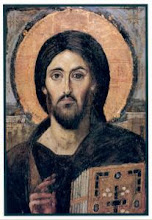Monday, January 27, 2014
God and Sacramental Theology
“The word sacrament in Greek means “mystery.” A sacrament is
an outward and visible sign instituted by God in order to convey inward and
spiritual grace. Thus the sacraments have become a main stay of the Church. It
is important to note that God’s grace is expressed through these religious
rights known as sacraments.” [Donald McKim, Westminster Dictionary of
Theological Terms pg. 245]
God wants to communicate and be in touch with human
beings. Creation is an overflow of God’s
divine love, and since God created humanity to partner with God in taking care
of creation, God seeks an intimate association with us. We experience this
interaction between God and ourselves through the actions of prayer and
meditation. Human acceptance of God takes place by faith, not evidence. This
process is called Revelation, meaning God
speaking to us. God’s revelation takes place not only within individuals,
but corporately as well. We have the capacity to see God working in the lives
of others, thus we experience revelation. When people exchange their experiences
of God through their conviction, communities of faith arise; in our case the
Church.
When God allows God’s self to touch the lives of humanity
God is fully present. God excludes no one from the divine love expressed within
the “God Head” or Trinity. This is often revealed in the sacraments. God holds
no one apart from God’s love. God’s love is concrete and embedded in the mostly
resistant nature of humanity. God seeks to radically change our lives by
reconciling God’s self to us. Like it or not we humans are dependent on God’s
revelation. How then does God get through to our often-hardened hearts? The
answer is by becoming vulnerable to us and our understandings. Thus
vulnerability is important for humanity in our relationship with God. We cannot
give or accept love unless we are willing to become vulnerable. God sets the
example.
God’s presence is often communicated to humanity through the
sacramental acts of the church. God approaches people in life, often seeking to
change them in a positive manner. Yet God is present in the sacraments of the
church without destroying our uniqueness. Through the sacramental structure God
seeks to shape our lives whether we are aware of it or not.
The language of the sacraments is often seen in symbols.
These symbols are signs or indicators of God’s holy presence in our
participation. A symbol is effective in our lives because it leads us into the
reality of God’s presence. The sacraments cause humanity to exercise the spirit
within. Thus we discover that God decisively shapes human reality from the
beginning of our lives to the end. Through the sacraments we experience God’s
grace and become aware of the intimate nearness of God; it is at this point
that revelation occurs.
In order to fully understand the sacraments we must first
believe that Jesus is God’s self-communication to humanity. Christology is
essential in understanding sacramental theology. Jesus is the authentic
revealer of God’s will, drawing humanity ever deeper into a relationship with
God. In Christ we recognize the how the most intimate nearness to God does not
disrupt our uniqueness, but rather liberates it to be ourselves.
Through the sacraments of baptism, confirmation, Eucharist,
reconciliation and unction we grow closer in our relationship to God through
the love of Christ, who is present in all the sacraments. God restores our
hope, heals our wounds and reconciles us to God through the sacramental acts
founded on the love and sacrifice of Jesus Christ.
Much of the information contained in this article is
credited to the book “Sacramental Theology” by Herbert Vorgrimler, as well as “Westminster
Dictionary of Theological Terms” by Donald K. McKim.
Wednesday, January 22, 2014
Growing in Faith
Growing in faith comes through the degree in which we are
willing to trust God. Faith is often an illusive ideal if it is not practiced
on a continuous and consistent basis. This is not to say that we all do not
struggle with faith at some point in our lives. We all experience the dessert
times in our lives in which God seems distant and even aloof.
There are many ways to grow deeper and richer in faith.
Personal piety and ongoing devotion is one way. Spiritual practices such as
centering prayer or walking the labyrinth are just a couple of examples of
others. But to truly grow in faith requires a commitment to Christ and a
spiritual grounding in his Church. This means a consistent practice of praying
the Daily Office and attending the Eucharist.
Often we only turn to God when there is a crisis in our lives.
We desperately send up prayers, hoping against hope that one of them will
stick. This is not the way to grow in a deeper relationship with Christ. Faith
takes time to cultivate and nurture. Faith comes from our participation in the
life of the church, mainly through the practice of liturgy and corporate
worship.
We all to often think that we can arrive at a deep and
sincere faith on our own, and perhaps we do develop faith to a certain degree.
But if we don’t participate in the full Body of Christ we lose so much
opportunity to genuinely grow in a transformative manner. Faith is
transformative. It changes our lives and the way in which we think, act and
pray. We need one another in order to grow and blossom in our faith in God.
Faith calls us to an active life in Christ, meaning an active life in his
Church. Why is the church so important? It is through our sacramental liturgy
and theology that we experience the risen Christ. The more we participate in
the liturgy, the deeper we are drawn to the center of Christ.
Attending church twice a year or sporadically doesn’t
benefit our faith. Sacramental Faith draws us into the Apostolic Faith. It is
here that we experience spiritual disciplines, maturity in faith and a full
spiritual life. We become flexible with ourselves, as well as others. The
Apostolic Faith grounds us in competency, and allows us to become more
committed Christians.
It is important to remember that faith is an action verb. It
doesn’t just occur passively. We must actively seek to grow in our faith by
committing our lives to a Christ centered life, allowing ourselves to build a
deeper relationship with both Jesus and one another. Faith is like exercising,
we don’t just go out and run twenty miles. We have to work our way up to that
point over time. Once we are there however we are not to rest on our laurels.
If we do we will not progress in faith, but actually slide backwards.
Friday, January 17, 2014
Conflict. Is it Always a Bad Thing
Conflict is inevitable amongst any organization, whether it
be secular or non-profit. Any time diverse personalities sit across the table
from one another there will always be a difference of opinion regarding ideas,
solutions and situations. Of course some people bring their own agendas to the
table, and some simply have strong feelings in regards to a particular subject.
The fact is that conflict is often a part of the decision making process and
must not be avoided. But does that make conflict bad? Absolutely not!
It is wonderful when we all agree on a particular agenda
item. It is fine, and even encouraged for people to express their difference of
opinion and ideas. Healthy conflict creates the tension that any organization
needs to move forward. The problems surrounding conflict occurs when we are not
working for the betterment of the institution, and instead wish to push our own
needs through at the expense of the process.
While there are many ways people react to conflict such as
avoidance, accommodation, compromise, competing and collaboration, the bottom
line is that we must all work together to effectively manage the task or make a
sound decision.
Avoiding the problem is not always bad. Perhaps we need to
put the topic off for more discernment or it may just not be worth the time and
energy to discuss. But if avoidance is used to separate ones self from the
issue at hand and not deal with the problem out of fear, then that is
unhealthy.
Accommodation places us in a category in which some one
simply gives up their stake in the polemic at their own expense. They give
themselves over to whatever decision is made. This is not a healthy way to move
an argument forward. We end up selling ourselves short by withdrawing our needs
completely.
Compromise is nothing more than annoying attempts to allow
everyone to get what he or she wants. No one feels fulfilled and frustration in
sues within the group.
Competing is the process in which a decision must be made.
Thus the authority figure overrides the group to pass the issue at hand. This
is sometime important to do, especially if the leader knows more about the
subject, and a decision must be made quickly. It is not always healthy to use
this model, but on occasion necessary.
Collaboration is where we come together and discuss the
topic and are able to come to some form of healthy agreement. Of course this process
is time consuming and if an issue needs immediate attention this model does not
work well.
In conclusion, conflict is inevitable. However, we have a
choice in the matter. We can either exercise conflict models in a healthy
manner, or one that is unhealthy and destructive to the group. Conflict often
creates the tension that provides the momentum we need to move forward as a
group in order to make sound and good decisions.
Much of this model and information is credited to
Robert Galliger and Michelle Hayne’s workshop on Conflict Management.
Tuesday, January 14, 2014
Choosing Our Words Wisely
We live in a society and world today in which we have to
choose our words very carefully. Not only are we experiencing a politically
correct period in our time, but one in which words have more power. Throughout
the history of this world words carry more weight and do more damage than any
weapon. Wars have started over the use of words. People have suffered over the
use of words. Nations have fallen over the use of words. As the Apostle James
reminds us, the tongue is an instrument that can do much damage to the Body of
Christ. Therefore we must be careful with the vocabulary we choose, because
while on the one hand our words have the ability to be soothing, the same
tongue can cut like a sharp knife.
Over the years I have made a conscious effort to improve my
vocabulary and seriously think through what I am going to say to someone,
especially if it is a delicate situation. Some words not only have multiple
meanings, but also have the power to bring hurt upon our neighbor. I have
unintentionally done damage to others at times due to the wrong use of a single
word. It is amazing the effect the tongue can have upon others. With a single
word we can inspire people to sore, or we can tear them down, leaving them in
pieces.
With a single word God brought all creation to life, and
with a single word God destroyed whole cities and cultures. We are not God! We
don’t always have the perfect vocabulary for every situation we encounter. Thus
it is vital that we be careful with the words we choose to say to people. It is
important that we not allow our broken nature to dominate our lives. By doing
so we become creatures of destruction, rather than creatures of nurture.
Jesus is the Living Word of God and perfect in all things.
Even in his hostile encounters with the Pharisees and Scribes, he chose his
words wisely. Did some of his words offend? Absolutely, but remember that Jesus
came into this broken world not to harm the world but to save us from sin and
death. There are times when harsh words are most appropriate for the sake of
the other, but they need to be thought through before spoken. Often the words
that hurt us the most are the words we most desperately need to hear. When
spoken in love and concern for the other harsh words may actually save or
redirect their lives. But we don’t have a license to go around and thoughtlessly
say what we feel, especially at the expense of others.
Wednesday, January 8, 2014
Martin Luther King and the Struggle for Black Freedom
The 1960’s were a period of civil unrest and protest in the
United States. The Vietnam War raged and was most unpopular back home. Out of
that protest grew the hippie generation who believed in anything that liberated
peoples freedom. The 1960’s were a defining era in American history, especially
for the Black people who were still subtly oppressed not only by society but
also by Christianity as well.
During this era of unrest and upheaval in this country the
“White Christ” was an ever-present reality. Clergy, especially those in the
south were opposed to Martin Luther King’s civil rights movement. King was
hated and despised by many for comparing the Black race to the Children of God.
The Black race was unfortunately viewed as less than human by many White’s. King
did not understand how people, especially the White race claimed to follow the
Gospel of Jesus Christ, yet at the same time supported racism. King was deeply
distraught over this matter and led the charge for equality for Black people.
He believed that God was just as active and present in the lives of Blacks as
anyone else who claimed the Christian faith. While he persisted in his civil
rights movement, he received many ugly threats.
One evening after a particularly cruel threat, King got up
out of the bed and made a cup of coffee. He later wrote about this experience
saying, “With a cup of coffee sitting untouched before me I tried to think of a
way to move out of the picture without appearing a coward…I decided to take my
problem to God. With head in my hands, I bowed over the kitchen table and
prayed aloud…’I am here taking a stand for what I believe is right. But I am
afraid. The people are looking to me for leadership, and if I stand before them
without strength or courage, they too will falter. I am at the end of my
powers. I have nothing left. I’ve come to the point where I can’t face it
alone.’”
Suddenly King felt the presence of the Holy Spirit, as he
had never experienced before. An inner voice from deep within said, “Stand up
for righteousness. Stand up for truth; and God will be at your side forever.”
At that moment Martin Luther King never again doubted God’s presence in the
struggle for justice. He was undoubtedly reassured that God was with him, as
well as his cause for equality amongst the Black race in their battle against
White oppression and racism. God would sustain Black people!
King would go on to remind Blacks that God was with them in
their struggles. For King, God’s presence and importance was determined by
God’s liberating actions throughout history. In one sermon he preached, “Above
all, we must be reminded anew that God is at work in the universe. He is not
outside the world looking on with a sort of cold indifference. Here on all the
roads of life he is striving in our striving. Like an ever-loving Father he is
working through history for the salvation of his children.” In this case the
Black race. He went on to say, “And when we allow freedom to ring…we will be
able to speed up the day when all of God’s children…will be able to join hands
and to sing in the words of the Old Negro spiritual, ‘Free at last, free at
last; thank God Almighty, we will be free at last’…I want it to be known that
we are Christian people. We believe in the Christian religion. We believe in
the teachings of Jesus. The only weapon we have in our hand this evening is the
weapon of protest.”
For Martin Luther King there was no discordancy between
protest and Christianity. King would go on to restore the relationship between
Christianity and social justice. He was a great man and a pioneer in addressing
the ugly issue of racism.
On Saturday, January 18, 2014, at 6:45pm the Progressive
Religious Coalition of Augusta will commemorate Martin Luther King at a service
at Trinity on the Hill Methodist Church. Beyond the Christian faith King
represents freedom for all religions. The guest preacher will be Arun Gandhi.
Several different religions will come together to honor this man whose distinct
cause was freedom for all people.
Much of the information found in this post was taken
form “The Black Christ,” written by Kelly Brown Douglas.
Subscribe to:
Comments (Atom)
Trinity Wall Street Conference Center Chapel

Our prayers rise like incense into heaven
Church of the Good Shepherd, Augusta, Ga.

"...And the sun shall not strike you by day, nor the moon by night."
























